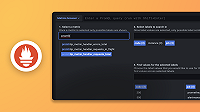otelcol.auth.headers
otelcol.auth.headers exposes a handler that can be used by other otelcol
components to authenticate requests using custom headers.
Note
otelcol.auth.headersis a wrapper over the upstream OpenTelemetry Collectorheaderssetterextension. Bug reports or feature requests will be redirected to the upstream repository, if necessary.
Multiple otelcol.auth.headers components can be specified by giving them different labels.
Usage
otelcol.auth.headers "LABEL" {
header {
key = "HEADER_NAME"
value = "HEADER_VALUE"
}
}Arguments
otelcol.auth.headers doesn’t support any arguments and is configured fully
through inner blocks.
Blocks
The following blocks are supported inside the definition of
otelcol.auth.headers:
| Hierarchy | Block | Description | Required |
|---|---|---|---|
| header | header | Custom header to attach to requests. | no |
| debug_metrics | debug_metrics | Configures the metrics that this component generates to monitor its state. | no |
header block
The header block defines a custom header to attach to requests. It is valid
to provide multiple header blocks to set more than one header.
| Name | Type | Description | Default | Required |
|---|---|---|---|---|
key | string | Name of the header to set. | yes | |
value | string or secret | Value of the header. | no | |
from_context | string | Metadata name to get header value from. | no | |
action | string | An action to perform on the header | “upsert” | no |
The supported values for action are:
insert: Inserts the new header if it does not exist.update: Updates the header value if it exists.upsert: Inserts a header if it does not exist and updates the header if it exists.delete: Deletes the header.
Exactly one of value or from_context must be provided for each header
block.
The value attribute sets the value of the header directly.
Alternatively, from_context can be used to dynamically retrieve the header value from request metadata.
For from_context to work, other components in the pipeline also need to be configured appropriately:
- If an
otelcol.processor.batchis present in the pipeline, it must be configured to preserve client metadata. Do this by adding the value thatfrom_contextneeds to themetadata_keysof the batch processor. otelcolreceivers must be configured withinclude_metadataset totrueso that metadata keys are available to the pipeline.
debug_metrics block
The debug_metrics block configures the metrics that this component generates to monitor its state.
The following arguments are supported:
| Name | Type | Description | Default | Required |
|---|---|---|---|---|
disable_high_cardinality_metrics | boolean | Whether to disable certain high cardinality metrics. | true | no |
level | string | Controls the level of detail for metrics emitted by the wrapped collector. | "detailed" | no |
disable_high_cardinality_metrics is the Grafana Alloy equivalent to the telemetry.disableHighCardinalityMetrics feature gate in the OpenTelemetry Collector.
It removes attributes that could cause high cardinality metrics.
For example, attributes with IP addresses and port numbers in metrics about HTTP and gRPC connections are removed.
Note
If configured,disable_high_cardinality_metricsonly applies tootelcol.exporter.*andotelcol.receiver.*components.
level is the Alloy equivalent to the telemetry.metrics.level feature gate in the OpenTelemetry Collector.
Possible values are "none", "basic", "normal" and "detailed".
Exported fields
The following fields are exported and can be referenced by other components:
| Name | Type | Description |
|---|---|---|
handler | capsule(otelcol.Handler) | A value that other components can use to authenticate requests. |
Component health
otelcol.auth.headers is only reported as unhealthy if given an invalid
configuration.
Debug information
otelcol.auth.headers does not expose any component-specific debug information.
Example
This example configures otelcol.exporter.otlp to use custom headers:
otelcol.receiver.otlp "default" {
http {
include_metadata = true
}
grpc {
include_metadata = true
}
output {
metrics = [otelcol.processor.batch.default.input]
logs = [otelcol.processor.batch.default.input]
traces = [otelcol.processor.batch.default.input]
}
}
otelcol.processor.batch "default" {
// Preserve the tenant_id metadata.
metadata_keys = ["tenant_id"]
output {
metrics = [otelcol.exporter.otlp.production.input]
logs = [otelcol.exporter.otlp.production.input]
traces = [otelcol.exporter.otlp.production.input]
}
}
otelcol.auth.headers "creds" {
header {
key = "X-Scope-OrgID"
from_context = "tenant_id"
}
header {
key = "User-ID"
value = "user_id"
}
}
otelcol.exporter.otlp "production" {
client {
endpoint = sys.env("OTLP_SERVER_ENDPOINT")
auth = otelcol.auth.headers.creds.handler
}
}


